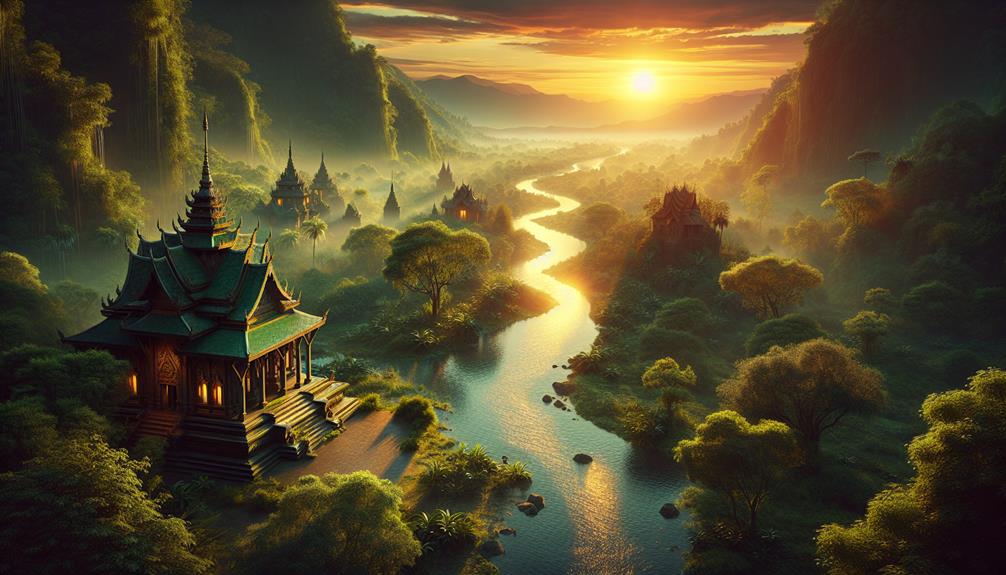What Does Vedas Say About Kama
Exploring the Vedas' perspective on Kama, the concept of desire, pleasure, and fulfillment takes on a profound significance within the ancient texts. Symbolism intertwined with rituals and moral guidelines reveal a complex understanding of Kama as more than mere physical desire but as a force that drives human existence and cosmic balance.
What Does Vedas Say About Kama
As we delve into the depths of the Vedas' teachings on Kama, we uncover a rich tapestry of wisdom that sheds light on the intricate relationship between desire and spiritual evolution, offering a unique perspective that continues to resonate through the ages.
What Does Vedas Say About Kama
Key Takeaways
- Kama in Vedas extends beyond physical desire to encompass love, connection, and fulfillment.
- Rituals harmonize physical, mental, and spiritual aspects, aligning desires with cosmic order.
- Kama symbolizes divine longing for union, driving personal transformation and spiritual growth.
- Upholding integrity, honesty, and ethical boundaries in desire expression promotes spiritual awareness and growth.
Vedas' Perspective on Kama
The Vedas offer profound insights into the concept of Kama, portraying it as more than mere desire but as a fundamental aspect of the human experience. In Vedic literature, Kama is depicted as encompassing a range of emotions, including love, longing, and the pursuit of pleasure. It is viewed not just as a physical desire but as a force that drives individuals towards connection, unity, and fulfillment.
What Does Vedas Say About Kama
Within the Vedas, Kama is celebrated as a natural and essential part of life, highlighting the importance of balance and harmony in its expression. It is seen as a force that binds individuals together, fostering relationships, and creating bonds of affection and intimacy. The Vedas emphasize the idea that Kama, when experienced with purity and righteousness, contributes to the well-being of society as a whole.
What Does Vedas Say About Kama
Symbolism of Kama in Vedas
Evident throughout Vedic literature, the symbolism of Kama extends beyond mere desire, delving into the profound connections between human emotions and spiritual growth. Kama in the Vedas symbolizes not only physical desire but also encompasses emotional, mental, and spiritual aspects of human experience. This symbolism highlights the intricate relationship between human desires and the journey towards spiritual enlightenment.
What Does Vedas Say About Kama
—
What Does Vedas Say About Kama
| Aspect | Symbolism |
|---|---|
| Physical | Represents attraction and affection in human relationships |
| Emotional | Symbolizes the depth of love and compassion within individuals |
| Mental | Signifies the power of focused intention and determination |
| Spiritual | Represents the divine longing for union with the higher self or the ultimate reality |
—
What Does Vedas Say About Kama
Understanding the symbolism of Kama in the Vedas allows individuals to reflect on the multifaceted nature of desires and emotions, guiding them towards achieving a harmonious balance between worldly pleasures and spiritual evolution.
Rituals and Kama in Vedas
Exploring the intricate intersection of rituals and the concept of Kama in the Vedas reveals profound insights into the spiritual practices and emotional dimensions of human experience. Rituals in the Vedas play a crucial role in harmonizing the physical, mental, and spiritual aspects of human life. These rituals are designed to invoke divine blessings, purify the mind and body, and foster a sense of gratitude and reverence towards the universe. In the context of Kama, rituals serve as a medium through which individuals can express their innermost desires, emotions, and aspirations in a sacred and structured manner.
The Vedas emphasize the importance of performing rituals with sincerity, devotion, and a pure heart to attain the fulfillment of Kama in its truest sense. Through rituals, individuals seek to cultivate a deep connection with the divine forces governing the universe and align their desires with the cosmic order. This alignment not only enhances the efficacy of one's prayers and offerings but also nurtures a sense of harmony and balance within oneself, paving the way for the realization of Kama in its highest form.
Kama as a Divine Force
In the spiritual realm of the Vedas, Kama emerges not merely as a human desire but as a revered and potent divine force intricately woven into the fabric of cosmic order and spiritual evolution. Kama, as a divine force, holds profound significance in Vedic teachings, shaping not only individual experiences but also the larger cosmic tapestry. Here are four essential aspects that shed light on the divine nature of Kama:
- Harmony: Kama symbolizes the harmonious alignment of human desires with the cosmic laws, leading individuals towards spiritual growth and connection with the divine.
- Unity: Kama serves as a unifying force, bridging the gap between the material and spiritual realms, emphasizing the interconnectedness of all beings.
- Transformation: Through the lens of Kama, desires are seen as catalysts for personal transformation and enlightenment, guiding individuals towards their higher selves.
- Divine Love: Kama embodies the essence of divine love, encouraging individuals to cultivate compassion, empathy, and kindness towards all creation, fostering a sense of belonging within the universal order.
Moral Guidelines on Kama
Establishing ethical boundaries for the expression of desire, the Vedas provide moral guidelines on navigating the domain of Kama within the spiritual framework.
Kama, when approached with reverence and mindfulness, is seen as a natural aspect of human existence. The Vedas emphasize the importance of channeling desires in a way that aligns with dharma, the righteous path. It is believed that fulfilling desires should not come at the expense of causing harm to oneself or others.
The scriptures promote the idea of mutual respect and consent in relationships, highlighting the significance of upholding integrity and honesty in romantic interactions. By embodying virtues such as compassion, kindness, and self-restraint, individuals can engage in acts of love and intimacy that are in harmony with the divine order.
The Vedas encourage individuals to cultivate a sense of spiritual awareness while engaging in desires, promoting a balanced approach that leads to personal growth and spiritual evolution.
Frequently Asked Questions
Is Kama Solely Related to Physical Desires, or Does It Encompass Emotional and Spiritual Aspects as Well According to the Vedas?
Kama, as per the Vedas, extends beyond mere physical desires to encompass emotional and spiritual aspects. It signifies a holistic approach to desire, acknowledging the interconnectedness of physical, emotional, and spiritual realms.
The Vedas emphasize the importance of understanding and balancing all these facets of kama to lead a fulfilling and harmonious life. This broader perspective on kama aligns with the Vedic teachings that seek to guide individuals towards a well-rounded existence.
Are There Any Specific Mantras or Prayers Mentioned in the Vedas for Invoking or Channeling Kama in a Positive Way?
In the realm of Vedic teachings, specific mantras and prayers are revered for their ability to invoke and channel energies in a positive manner. These sacred incantations serve as beacons of light, guiding practitioners towards harmony and fulfillment.
While the Vedas do not explicitly outline mantras solely dedicated to invoking or channeling Kama, the holistic approach of Vedic wisdom encourages individuals to align their intentions and actions with the universal principles of love, desire, and spiritual growth.
How Do the Vedas View the Concept of Consent in Relation to Kama and Intimate Relationships?
In the Vedic perspective, consent holds fundamental importance in the realm of kama and intimate relationships. Respect for individual autonomy and mutual agreement are pillars that uphold the sanctity of such connections.
The Vedas emphasize the significance of honoring boundaries and ensuring that all interactions are based on mutual understanding and willingness. By valuing consent, the Vedas promote harmonious and respectful unions that nurture the well-being of all involved.
Are There Any Specific Rituals or Ceremonies Mentioned in the Vedas That Are Aimed at Enhancing One's Understanding and Practice of Kama?
Exploring the Vedic texts reveals an intricate tapestry of rituals and ceremonies aimed at enriching one's understanding and practice of various aspects of life. These rituals often encompass diverse facets of human existence, including relationships and desires.
While not explicitly focused solely on enhancing one's understanding of kama, these ceremonies, when performed with sincere devotion and intent, contribute to a holistic approach towards embracing and nurturing all dimensions of human experiences.
What Role Does Kama Play in the Overall Spiritual Growth and Development of an Individual According to the Vedas?
Kama, as per Vedic teachings, serves as a vital aspect in an individual's spiritual evolution. It is seen as a natural and essential component of human experience, guiding individuals towards emotional fulfillment and connection.
When approached with balance and purity, kama can foster personal growth, enhance relationships, and deepen one's understanding of oneself and others. The Vedas emphasize the importance of harmonizing kama with dharma, artha, and moksha for holistic spiritual development.
Conclusion
In conclusion, the Vedas present Kama as a complex concept, symbolizing not just physical desire but also the pursuit of spiritual union. Rituals associated with Kama are seen as a way to harness its divine power for personal and societal growth.
However, moral guidelines caution against indulging in Kama without restraint. So, next time you feel the urge to swipe right, remember – even the ancient texts had something to say about that!

